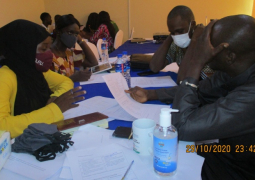
The exercise, held at the Ocean Bay Hotel in Cape Point, Bakau, brought together major players from both the public and private sectors involved in financial reporting and auditing.
Speaking at the opening ceremony, Suleiman Fode Drame, Chief Executive Officer of FROB, emphasised the significance of the initiative in shaping The Gambia’s economic future. He explained that the issuance of PIE Rules (Vol. 1) and Audit Rules (Vol. 1) fulfils a legal obligation under the 2013 Financial Reporting Act, while also reflecting a shared ambition to build a financial ecosystem rooted in trust, professionalism, and transparency.
“These rules touch on the core pillars of our profession: transparency, professionalism, and independence,” Drame stated. “From certifying financial statements by qualified professionals, to regulating and overseeing auditors, to enforcing ethical standards and quality assurance frameworks, each provision is aimed at protecting the public interest.”
Drame further noted that while the rules are legally mandated, their true value lies in consistent and fair application by regulators, professionals, and corporate leaders. He stressed that credible financial reporting affects every Gambian, from investors seeking certainty, to businesses pursuing growth, to citizens demanding accountability in the management of public resources.
In an interview, Attikan Dibba, representing the Central Bank Governor and Chairperson of FROB, clarified that the PIE Rules would apply not only to public bodies but also to private entities that meet defined thresholds.
“Where a private entity qualifies as a public interest entity, it will be governed under the PIE Rules,” he explained.
Dibba added that the framework is designed to guide how PIEs operate in The Gambia, establish standards for auditors, and reinforce their role in improving financial reporting. The rules, he said, eliminate ambiguity by setting clear guidelines, while also supporting business owners in detecting irregularities and safeguarding their interests.
The validation of the PIE and Audit Rules is widely seen as a critical step in aligning The Gambia’s financial governance with international best practices. Stakeholders hailed the move as a foundation for greater investor confidence, improved corporate accountability, and enhanced public trust.





